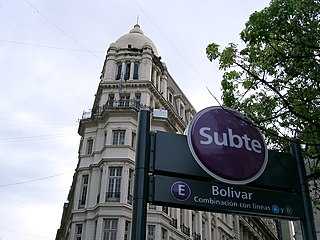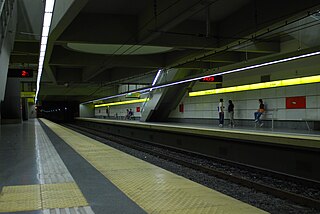
The Buenos Aires Underground, locally known as Subte, is a rapid transit system that serves the area of the city of Buenos Aires, Argentina. The first section of this network opened in 1913, making it the 13th earliest subway network in the world and the first underground railway in Latin America, the Southern Hemisphere, and the Spanish-speaking world, with the Madrid Metro opening nearly six years later, in 1919. As of 2023, Buenos Aires is the only Argentine city with a metro system.

Line A is the oldest line of the Buenos Aires Underground. Opened to the public on 1 December 1913, it was the first underground line in South America, the Southern Hemisphere and the Spanish-speaking world. It made Buenos Aires the 13th city in the world to have an underground transport service. The line stretches 9.8 km (6.1 mi) from Plaza de Mayo and San Pedrito and runs under the full length of the Avenida de Mayo and part of the Avenida Rivadavia, and is used by 258,000 people per day.

Line C of the Buenos Aires Underground, that runs from Retiro to Constitución terminus, opened on 9 November 1934, and it has a length of 4.3 km (2.7 mi). It runs under Lima Sur, Bernardo de Irigoyen, Carlos Pellegrini, Esmeralda, la Plaza San Martín and Avenida Ramos Mejia streets. It not only connects to every other line on the system, but its termini at Retiro and Constitución also connect it to some of the most important commuter rail networks in Buenos Aires, such as the Mitre and Roca lines and also long-distance passenger services. It is thus an important artery in Buenos Aires' transport system. At the same time, it is also the shortest line in both terms of length and number of stations.

Line H is a line of the Buenos Aires Underground. The first phase, between Plaza Once and Caseros, which opened on 18 October 2007, currently stretches over 8.8 km between Hospitales and Facultad de Derecho stations. It is the first entirely new line built in Buenos Aires since the opening of Line E on 20 June 1944.

Line E of the Buenos Aires Underground runs from Retiro to Plaza de los Virreyes, a total distance of 12 km. Opened in 1944, the Line E was the last completely new line to be added to the Buenos Aires Underground, until 2007 when Line H was opened. The line has a history of being re-routed and extended due to having been historically the line with the lowest passenger numbers on the network.

The Belgrano Sur line is an Argentine 1,000 mmmetre gauge commuter rail service in the Greater Buenos Aires area, currently operated by state-owned enterprise Trenes Argentinos. The Belgrano Sur runs over tracks and through stations built by the Franco–Belgian-owned Compañía General de Buenos Aires and British Midland companies at the beginning of the 20th century.

Alberti is a station on Line A of the Buenos Aires Underground. The station belonged to the inaugural section of the Buenos Aires Underground opened on 1 December 1913, which linked the stations Plaza Miserere and Plaza de Mayo. Like the Pasco station, it is one of two stations of the line which only has one platform, in this case only serving passengers heading towards San Pedrito. The other platform is located just a few meters away, but was closed in 1953 since the proximity of Pasco station meant having so many stops in such quick succession slowed the line's frequency.

Pasco is a station on Line A of the Buenos Aires Underground. The station belonged to the inaugural section of the Buenos Aires Underground opened on 1 December 1913, which linked the stations Plaza Miserere and Plaza de Mayo. Like the Alberti station, it only has one platform, which in this case only serves passengers traveling to Plaza de Mayo. The other platform is located just a few meters away, but was closed in 1953 since the proximity of Alberti station meant having so many stops in such quick succession slowed the line's frequency.

Corrientes Station is a station on Line H of the Buenos Aires Underground. The station was opened on 6 December 2010 as part of the one-station extension of the line from Once. It served as the line's north terminus until the extension of the line to Las Heras was completed on 18 December 2015. From here, passengers may transfer to the Pueyrredón Station on Line B.

Venezuela Station is a station on Line H of the Buenos Aires Underground. The station was opened on 18 October 2007, as part of the inaugural section of the line, between Once - 30 de Diciembre and Caseros.

Humberto I Station is a station on Line H of the Buenos Aires Underground. From here, passengers may transfer to Jujuy station on Line E. The station was opened on 18 October 2007, as part of the inaugural section of the line, between Once - 30 de Diciembre and Caseros.

Caseros Station is a station on Line H of the Buenos Aires Underground. The station was opened on 18 October 2007, as the southern terminus of the inaugural section of the line, between Once - 30 de Diciembre and Caseros. It remained the line's southern terminus until the opening of Parque Patricios Station on 4 October 2011.

Hospitales Station is a station and terminus on Line H of the Buenos Aires Underground. Here passengers may transfer to Metrobus Sur. It was opened on 27 May 2013 as a one-station extension from Parque Patricios. It is currently serving as the southern terminus of the line, until it is extended to Sáenz.

The Buenos Aires Metrobús is a 50.5 km (31.4 mi) network of dedicated separated lanes and stations for buses that serve the city of Buenos Aires, Argentina. Designed as a Bus Rapid Transit system, it mixes a few bi-articulated buses with conventional buses. The headway is the same as before the implementation of the system, and the buses on the system use the same brand as the main network, that is, maintaining their previous branding as common bus lines with their own numbers. The service operates 24 hours a day and 365 days a year, with 2-4 minute frequencies during the day and 10–15 minutes at night.

Avenida Pueyrredón is an avenue that runs through the Recoleta and Balvanera neighborhoods of Buenos Aires, Argentina, and goes from southwest to northeast, parallel to Avenida 9 de Julio. It starts at Avenida Rivadavia, and ends at Avenida Figueroa Alcorta.

Córdoba Station is a station on Line H of the Buenos Aires Underground, opened in 2015. It is located in the junction of Córdoba and Pueyrredón Avenues, in the limit with Balvanera and Recoleta neighborhoods. It is near to the University of Buenos Aires faculties of Economics, Pharmacy and Medicine. The station was opened on 18 December 2015 as part of the extension of the line from Corrientes to Las Heras.

Santa Fe – Carlos Jáuregui Station is a station on Line H of the Buenos Aires Underground which opened on July 12, 2016 on already operating section of the line. The station combines with Line D at Pueyrredón station. It's located in the intersection of Santa Fe and Pueyrredón avenues, in the Buenos Aires barrio of Recoleta.

Facultad de Derecho-Julieta Lanteri Station is a station on Line H of the Buenos Aires Underground which opened on 17 May 2018 as a one-station extension from Las Heras. It currently serves as the northern terminus of the line until it is extended to Retiro. It is located next to the University of Buenos Aires Faculty of Law and the City's Exhibition and Conventions Centre and it is near the Recoleta Cemetery and Fine arts museum.

Sáenz is a station under construction and the future terminus of Line H of the Buenos Aires Underground. Once complete, the station will connect with the Belgrano Sur commuter rail line and the Metrobus Sur BRT line in a new facility designed for the connection of the three lines.

The 300 Series are a set of underground cars manufactured by Alstom in Brazil for use on the Buenos Aires Underground. They are used on Line H of the network, and more have been introduced on Line D where they operate alongside the similar 100 Series.


























